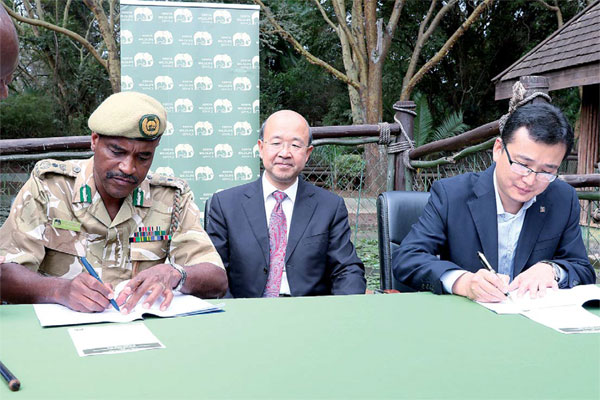China backing African conservation efforts

China makes 'serious commitment' to fight poaching as elephant numbers dwindle
China's commitment to supporting African initiatives aimed at conserving the continent's wildlife has won acclaim from conservationists and analysts.
The conservationists acknowledge that the Chinese government's technical and financial support has played a critical role in protecting wildlife resources by combating poaching and the illegal trade of animal parts.
Sikhumbuzo Zondi, research assistant at the University of South Africa's Institute for Global Dialogue, says China has greatly helped the continent to achieve lasting solutions to challenges facing its wildlife population.
| Kitili Mbathi (left), Kenya Wildlife Service director-general, and Zhang Haifeng (right), chairman of Kenya-China Economic and Trade Association, sign a sponsorship contract at KWS headquarters in Nairobi on Nov 8. Liu Hongjie / China Daily |
In fact, China has been at the forefront, he says, in conserving Africa's wildlife through strengthening cooperation under the Convention on International Trade in Endangered Species of Wild Fauna and Flora, also known as CITES.
CITES promotes training programs and offers financial and technical support to countries including Kenya, South Africa, Zimbabwe and Botswana that have been hardest hit by the illegal wildlife trade. The objective of the training is to strengthen Africa's management and law enforcement efforts.
Zondi says China has signed agreements on wildlife protection with South Africa and Kenya as a way of stepping up its commitment to cooperation on wildlife protection.
"The Chinese government in its bid to combat domestic trade in ivory has summoned its corporations that are engaged in wildlife operations to contribute $200,000 to the African Elephant Conservation Fund. This clearly demonstrates China's commitment to combating elephant poaching and the domestic trade in ivory," Zondi says.
Since 2013, China has been leading an international crackdown on wildlife crimes through an effort called Operation Cobra I, which involves 22 countries in Asia and Africa. Since its inception, more than 200 cases involving the smuggling of threatened species have been solved, and more than 100 suspected poachers have been detained. This is in addition to seizing 6.5 tons of ivory.
The country has promised to extend the operation and carry out more regional campaigns against the illegal wildlife trade both in China and Africa.
"All these efforts demonstrate China's serious commitment to fighting poaching," Zondi says. "It also means that African countries that are hardest hit by illegal wildlife trade will experience profound effects in their elephant conservation and anti-ivory trafficking. This is because cutting consumer demand for wildlife products in China could essentially prevent the loss of Africa's last elephant stocks to poaching."
Kitili Mbathi, the Kenya Wildlife Service director-general, says the Chinese government has been very supportive of Africa's initiatives on wildlife conservation.
He says the directive by Beijing to close down domestic markets for ivory and rhinoceros horn will help the continent combat poaching.
"This is good news because we are working hard to stop poaching, and as long as there is a market, the vice will continue," Mbathi says.
According to a report by Save the Elephant, a United Kingdom-registered charity based in Kenya, 100,000 elephants in Africa were killed for their ivory from 2010 to 2012.
A separate report by the International Union for Conservation of Nature states that currently Africa holds an estimated 415,000 elephants, which is more than 100,000 fewer than there were in 2007.
According to the survey, ivory use has existed for centuries, but market demand for ivory in Asia and the United States has led to an unprecedented level of elephant poaching.
Ivory, the material of elephant tusks, is used for jewelery, carvings, ornaments, medicine, chopsticks, signature stamps, musical instruments and many other things.
To permanently shut down the illegal wildlife trade, Zondi is of the opinion that governments in China and Africa should establish a cross-border anti-corruption institute.
According to Corruption Watch, a nonprofit organization based in South Africa, corruption at all levels of policy and law enforcement remains a massive issue, and unless it is urgently and effectively addressed, curbing the illegal wildlife trade will remain a distant goal.
Any legal trade "fuels corruption, provides opportunities to launder illegal products, confuses consumers, makes law enforcement infinitely more difficult, and inevitably plays into the hands of the criminal networks controlling the poaching and trafficking", an article on the organization's website says.
Another way to combat the illegal trade, Zondi says, is setting up a special fund and deploying technology and equipment to assist in creating nature reserves in African countries for threatened species.
"There is also a need to enforce community supervision at government and community levels, to encourage the renovation and upgrading of existing nature reserves in order to reduce human-wildlife confrontations and achieve sustainable development," he says.
Zondi says the Chinese government should impose heavy punishments on citizens found guilty of wildlife poaching and trade in Africa.
"Chinese companies that orchestrate wildlife poaching should pay a heavy price and be stripped off their licenses to do business, not just in China but throughout the world, so that others may learn from them," he says.
Paul Gathitu, spokesman for Kenya Wildlife Service, calls for infrastructure support for conservation (roads, bridges and airstrips in protected areas), as well as anti-poaching campaigns and capacity building among Africa's conservation organizations as areas of strategic cooperation between China and African governments.
edithmutethya@chinadaily.com.cn
(China Daily Africa Weekly 11/25/2016 page19)
Today's Top News
- Xi to attend SCO Tianjin Summit, host relevant events
- AI role key in stimulating consumption
- Discovering truths about happiness on roof of world
- 60 years of progress marked
- The prospects for Cambodia-China cooperation
- Glimpses of Chinese path to modernization































